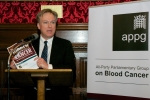Blood cancer is the most common cancer among people under the age of 30, and as the UK’s third biggest cancer killer represents one of the great public health challenges of our time.
As Chair of the All-Party Parliamentary Group on Blood Cancer since helping establish it before the general election, I’m delighted to launch our inaugural report later today (Wednesday 17th January) on blood cancer care in the NHS.
One of the key findings of our inquiry reiterated the salience of early diagnosis. Diagnosing one of the 137 different types of blood cancer can be complex because symptoms such as back pain or tiredness can be misunderstood or misdiagnosed.
Other symptoms for blood cancers include night sweats, weight loss and bruising and can in the first instance appear similar to feeling ‘run down’ or having the flu.
GPs should be given the support and the backing to raise awareness of the symptoms. A simple blood test should be offered to assist with early diagnosis for people displaying one or more of these. GP education and training needs to be improved to increase knowledge of blood cancer symptoms.
Unlike solid cancer tumours, blood cancer cannot be surgically cut out, and therefore blood cancer patients have a very different experience to those with other forms of cancer.
Something which may seem as simple as the terminology surrounding blood cancer can have an effect on ensuring support for patients. The different types of blood cancer include the various strands of leukaemia, lymphoma and myeloma, for example.
In each of these there is one common word missing – ‘cancer’. If you’re told you have one of these forms of blood cancer, there runs a risk that the gravity of your condition may not be comprehended fully because of the lack of this important word.
The APPG’s inquiry has found that the increasing use of the overarching term ‘blood cancer’ has helped patients who have been diagnosed recently to gain a greater understanding of not only how the disease is part of a wider clinical area, but that there is an entire community of health professionals, charities, and patient support groups to help them.
The Government and NHS England need to address, as a matter of urgency, the specific needs of blood cancer patients, and to take immediate steps to improve their care. The full power of the NHS and the Department of Health must be used to not only work in partnership with the charity sector, but to also give greater consideration to non-solid tumour cancers when developing policy.
I’ve also secured a Westminster Hall debate today on NHS blood cancer care, where APPG colleagues and I’ll go into the challenges in further detail. Action in the priority areas outlined in our report will require collaboration between patients and advocacy groups, the Government, medical professionals and local healthcare bodies such as Clinical Commissioning Groups.
The scale of the challenge is vast but it’s one that we can meet by working together.
Henry Smith MP
Henry Smith is Member of Parliament for Crawley and Chair of the All-Party Parliamentary Group on Blood Cancer

